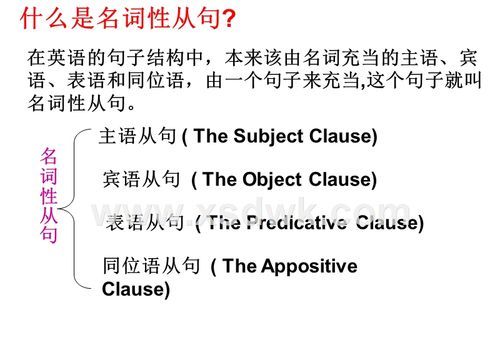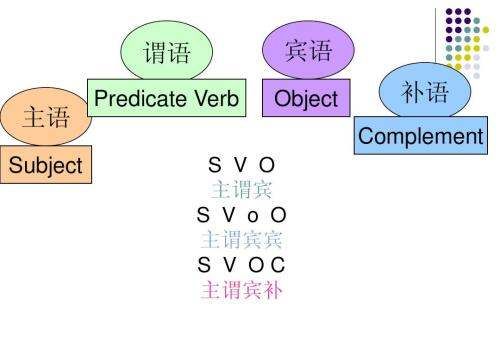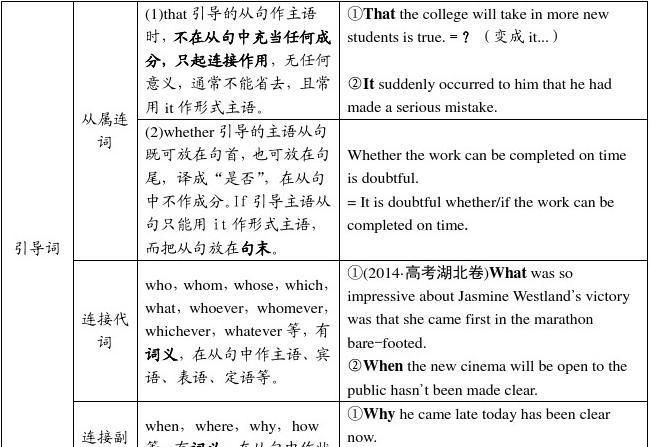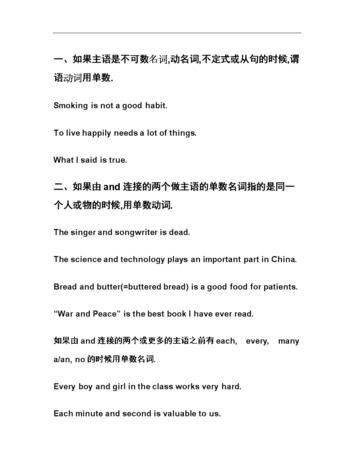本文目录
名词化的形容词做主语的句子
The beauty of nature usually impresses us deeper in our hearts.

英语中的主语是什么意思
1、主语
主语,是执行句子的行为或动作的主体,如“我写字”中的“我”,就是主语。
作主语的词:名词,代词,名词化的动词,形容词,分词,副词或数词等,动词不定式或不定式短语, 从句,某些固定词组。
名词作主语的用法:
例:The villagers didn't realize how serious the pollution was until the fish in the river died.
直到河里的鱼死了,村民们才意识到污染的严重性
动名词作主语的用法:
例:Smoking is habit difficult to break.
抽烟的习惯很难打破的。
2、谓语
谓语由简单动词或动词短语(助动词或情态动词+主要动词)构成,依据其在句中繁简程度可把谓语分为简单谓语和复合谓语两类。不论何种时态,语态,语气,凡由一个动词构成的谓语都是简单谓语。
谓语构成:谓语动词一般由动词的各种时态来体现。
例:
I like walking.
我喜欢走路。(一般现在时主动语态)
I made your birthday cake last night.
昨晚我做好了你的生日蛋糕。 (一般过去时主动语态)
It is used by travelers and business people all over the world.
全世界旅行者和商人都使用它。
3、宾语
宾语是指一个动作(动词)的接受者。宾语分为直接宾语和间接宾语两大类,其中直接宾语指动作的直接对象,间接宾语说明动作的非直接,但受动作影响的对象。
一般而言,及物动词后面最少要有一个宾语,而该宾语通常为直接宾语,有些及物动词要求两个宾语,则这两个宾语通常一个为直接宾语,另一个为间接宾语。
名词作宾语:
Show your passport, please. 请出示护照。
代词作宾语:
She didn't say anything. 她什么也没说。(此处为不定代词)
数词作宾语:
How many do you want? — I want two. 你要几个?- 我要两个。
名词化的形容词作宾语:
They sent the injured to the hospital.他们把伤员送到医院。
不定式或ing形式作宾语:
They asked to see my passport. 他们要求看我的护照。
从句作宾语:Did you write downwhat he said? 你把他的话写下了没有?

扩展资料
英语语法中除了简单句式外,还有复杂句式,即各种各样的从句。
从句不能单独成句,但它也有主语部分和谓语部分,是一个特殊句子,就像一个句子一样。所不同在于,从句须由一个关联词引导。
根据从句语法功能的不同可分为:主语从句、表语从句、宾语从句、同位语从句、定语从句和状语从句6类。
前四类由于主语从句、表语从句、宾语从句及同位语从句在句子的功用相当于名词,所以通称名词性从句;定语从句功能相当于形容词,称为形容词性从句;而状语从句功能相当于副词,称为副词性从句。
状语从句还可以分为条件状语从句、原因状语从句、地点状语从句、目的状语从句、让步状语从句、比较状语从句、方式状语从句、结果状语从句和时间状语从句。
参考资料来源:百度百科-英语语法
英语里什么词可以做主语和宾语
主语:主语可由名词、代词、数词、不定式、动名词、名词化的形容词和主语从句表示(主要是名词或起到名词作用的其他形式)
谓语:动词做谓语 1、简单谓语:由一个动词或动词短语构成。
2、复合谓语:(1)由情态动词或其他助动词加行为动词构成
(2)由系动词加表语构成。
表语:表语一般由名词、代词、形容词、分词、数词、不定式、动名词、介词短语、副词及表语从句表示(主要是名词和形容词或起到名词,形容词作用的其他形式)
宾语:宾语可有名词、代词、数词、不定式、动名词、名词化的形容词和宾语从句构成(主要是名词或起到名词作用的其他形式)
宾语补足语:宾补可由名词、形容词、副词、不定式、分词、介词短语和从句充当
定语:定语可以由形容词、名词、代词、不定式短语、介词短语、动名词、动词的现在分词、动词的过去分词表示(主要是形容词或起到形容词作用的其他形式)
状语:状语可以由副词及副词性词组、介词短语、不定式短语、分词短语、名词、状语从句表示(主要是副词或起到副词作用的其他形式)

托福写作名词化句子有哪些好处
A 谓语动词的宾语部分
原句:I do not know either what she meant or what he intends.
名词化:I do not know either her meaning or his intentions.
B 结合被动形式
原句:If people decide without enough persuasive information,...
名词化:If a decision is made without enough persuasive information,...
C 取代诸如从句中“the fact that”的用法
原句:The fact that I denied what he accused me of impressed the jury.
名词化:My denial of his accusations impressed the jury.
更好的名词化:a. When I denied his accusations, I impressed the jury.
b. In denying his accusations, I impressed the jury.
D 名词化部分用在there is/are的后面
原句:We demand that the government stop taxing entertainment.
名词化:There is a demand for an end to taxation on entertainment.
原句:The floods considerably eroded the land.
名词化:There was considerable erosion of the land from the floods.
然而,有些时候,在我们的思维方式中认为理所应当使用“名词化”时,老外认为是没有必要的。比如:
A 名词化部分跟在动词后面
原句(名词化“冗余”):The police conducted an investigation into the matter.
改后:The police investigated the matter.
B 名词化部分作为主语
原句:Our discussion is concerned with a tax cut.
改后:We discussed a tax cut.
C 连续进行名词化
原句:a. First, she reviewed the evolution of the dorsal fin.
b. There was a first a review of the evolution of the dorsal fin.
改后:First, she reviewed how the dorsal fin evolved.
D 连接部分名词化
原句:Their cessation of hostilities was because of their personnel losses.
改后:They ceased hostilities because they lost personnel.
原句:The instability of the motor housing did not preclude the completion of the field trials.
改后:Even though the motor housing was unstable, the research staff completed the field trials.

以上就是关于名词化的其他词作主语句式 ,名词化的形容词做主语的句子的全部内容,以及名词化的其他词作主语句式 的相关内容,希望能够帮到您。

